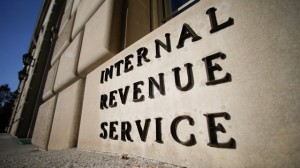I know it ‘s been another busy week for all of us. Please note the upcoming IRS webinar training for QSCBs in the “Out and About” Section!
So…here goes…today’s Monday Muni Minutes!
Enjoy and have a great week! Deb
CURRENT EVENTS
DETENTION from the IRS? School District’s Refunding Bonds to be Audited
As teachers and students at the Clark County School District in Nevada (which encompasses the city of Las Vegas) are entering the home stretch for the school year, their financial  administrators and the state are gearing up for some extra homework and possibly staying after school…they are being audited by the IRS.
administrators and the state are gearing up for some extra homework and possibly staying after school…they are being audited by the IRS.
Whoever said detention is just for kids?
In an event notice on EMMA on Wednesday, the issuer disclosed that their $153.93 million series 2006 advance refunding bonds are being audited.
While the IRS Notice said that the audit was routine, it should be noted that advance refundings are part of the IRS market segment “hot items list” shared in February during their IRS update webinar.
Why are advance refundings a big deal?
As you may recall, the IRS, in addition to bringing back questionnaires as part of its increased enforcement efforts, is also looking seriously at advance refundings as one area where there could be increased instances of non-compliance.
That is a theory the IRS is testing…
These 2006A refunding bonds were issued to take out bonds issued in 1996 and 2002 – so the audit will focus on the expenditure documents dating back to 1996 as well as the 2006 advance refunding transaction.
[Editor’s Note: Again, while no specific concerns have been listed in the IRS Notice, this is a reminder that we need to be diligent in our post issuance compliance efforts – back to the original issuance of the bonds.]
Would Bus Fares Cause Bonds to be PABS? IRS PLR Says No
With all the attention and focus on the dwindling coffers for both the federal and state highway infrastructure funds, many municipalities are turning to public-private partnerships or P3s  as a way to pay for critical work.
as a way to pay for critical work.
Although the identity of the issuer in the ruling is not released, the PLR appears to be for Build America Bonds (BABs) and a P3 – although the ruling did not specifically confirm either.
However, with the growing interest in P3s also comes the big question:
Will revenues from a P3 cause bonds to become taxable due to private activity?
This has been a sticky wicket given all the focus on private business use and rulings regarding control from private entities, particularly where a private entity will manage part of the completed project under a management contract.
Here are the major facts:
- The issuer is a political subdivision of a state
- The state provides bus services to the public
- Some of the routes are on US Highways
- Members of the general public pay fares to ride the bus
- The fare price depends on which route the rider travels on
- The road project will include one managed lane in each direction
- A private company will operate the managed lanes under a management contract
- The issuer will contribute money to the construction and also finance equipment
In this case, the IRS ruled that bus fares for riders on a privately operated highway lane would NOT make the bonds PABs.
Bond counsel overwhelmingly agreed that the IRS reached the right decision.
Todd Cooper, a partner at Squire Patton Boggs said, “A rider of a public bus rarely pays enough in fares to cover the full cost of the ride. The remainder is typically subsidized by other tax revenues and federal subsidies,”
Cooper continued, “Thus, it is very likely the fares would not even cover the operating expenses of the bus and none of the fare revenue would be available for debt service on the BABs.”
It should be carefully noted that while this ruling sheds light on many of the questions surrounding P3s and how revenues do or do not impact the tax-exempt status of the bonds, many questions still remain.
In fact, the taxation section of the American Bar Association is working on a “comment project” surrounding P3s. Over the last year or so, there has been increased pressure to look at P3s as a financing tool.
Many are looking to the Treasury Department and the IRS to provide guidance that will clarify how P3s can be successfully structured to avoid PBU and PABs.
Stay tuned…more to come.
[Editor’s Note: As there are lots of issues that can arise in these newer arrangements, we, as issuers, are going to need a lot more clarity on what we can and cannot do.]
OUT & ABOUT
IRS Webinar:
QSCBs – Qualified School Construction Bonds
June 18, 2015, 2PM EST Sign up Here.
You will learn rules and requirements, post issuance compliance and resources available for issuers
Conferences:
The Bond Buyer’s Midwest Municipal Market Symposium
June 30, 2015 InterContinental Chicago Magnificent Mile, Chicago, IL
Resources:
Check out the “muni deal of the week”…and look at it from the bondholder’s perspective.
On-Demand Post Issuance Compliance Training for Issuers
“Compliance Basics” – a Free, 3-part video training, plus the Monday Muni Minutes
On-Demand Webinar
Resource: On Demand Replay of Continuing Disclosure after MCDC
Slides: Final Slide Deck for Continuing Disclosure after MCDC
Muni Market Minute Updates
(Quick news bits on topics we’ve covered in earlier MMM editions!)
Next up as CFO – Can Brown take Chicago from Red to Black?
Mayor Emanuel has tapped a veteran public finance banker to take the helm as his new CFO – Carole Brown – and what a welcoming party she just got – a series of ratings downgrades.
(see next article for details…)
Introducing Carole Brown….
As a managing director at Barclays, and head of that firm’s Midwest muni practice, Ms Brown brings an impressive resume of expertise to the CFO position, including a reputation of strength and improvement.
A graduate of Harvard University with a MBA from Northwestern University’s Kellogg School of Management, she has decades of public finance experience and also served as chairwoman of the Chicago Transit Authority (CTA) from 2002 to 2009.
“Carole Brown brings decades of financial experience to the City of Chicago,” Mayor Emanuel said. “Carole’s experience and reputation as a tough, but honest financial manager will be a valuable asset as we continue to create a conducive environment for job creation and economic growth for the City of Chicago. “
Brown is a familiar face in Chicago – from her tenure with the CTA and her work in the public finance arena at Barclays, Lehman Brothers and First National of Chicago.
“I am grateful to Mayor Emanuel for offering me this opportunity to serve Chicago residents, and I am eager to begin working with the mayor’s financial team to address the city’s financial challenges,” she said in a statement last week.
[Editor’s Note: Carole Brown will have plenty to do once she sits in the CFO hotseat – including refinancing Chicago’s floating debt to fixed rate after a series of downgrades, as noted in the article above.]
Junk or No Junk…Chicago is Heading to Market (the Bond Market that is…)
Despite Moody’s downgraded $8.9 billion of Chicago’s GO, sales tax and motor fuel backed bonds to junk status last week, the city plans to continue the next steps in its debt restructuring plan and head to the bond market to convert its volatile, swapped floating  rate bonds to fixed rate.
rate bonds to fixed rate.
However, last week’s two-notch downgrade by Moody’s was just the first domino. S&P also dropped Chicago two notches to A- with a credit watch. On Friday, Fitch lowered the city’s GO and sales tax bonds one tick to BBB-plus.
It was one heck of a week for Chicago.
These events triggered multiple bank agreement defaults as well as swap termination provisions – to the tune of $2.2 billion. While the city scrambles to either stall or renegotiate these provisions, its pool in investors continues to shrink.
So, given the smaller group of bondholders, why would Chicago go to market?
Opportunity.
Lyle Fitterer, head of tax-exempt fixed income at Wells Capital Management, probably said it best: In his blog post on Friday titled, a blog post Friday titled “Chicago’s pensions sink its credit rating; Trouble or opportunity?” he said “For the patient investor, we believe both Chicago-area and Illinois state municipals offer opportunity,”
So, while there is opportunity, will it happen…and at what cost?
After the downgrades, some of Chicago’s paper was trading 200 to 300 basis points over MMD, as compared to 84 to 89 basis points over MMD in 2013 and 145 to 161 basis points over MMD last year.
That’s steep.
While there are investors who will be carefully studying the risk-return tradeoff of Chicago’s paper in the market, we will want to bear in mind Fitch Rating’s warning in their downgrade: “Failure of the city to successfully remarket its variable-rate debt in fixed-rate mode would likely trigger a downgrade.”
While Chicago still has some options with its lines of credit and short-term borrowing programs, those options are not long-term solutions. We will be watching Ms Brown’s efforts as she takes over the CFO position – paying close attention to how Chicago’s remarketing efforts proceed.
[Editor’s Note: As we know, pension obligations played a huge role in Chicago’s financial woes. S&P duling noted that, while the city is making efforts to improve its finances, that those efforts are going to be challenging, at least in the short-term.]
We hope you found this week’s mini edition of the Monday Muni Minutes valuable and informative.
Chat soon!
As always, your comments are welcome…scroll down and let us know what you think about any of the articles!
To your compliance success,
Debbie
The greatest compliment you can pay us is to share this newsletter with your issuer friends….
P.S. Remember, invite your issuer friends to join us on Issuer 2 Issuer and to get their free online training, PIC Basics!
P.P.S Want a one-click way to get faster information? If you are on LinkedIn, you can get access to breaking muni news articles as well as interesting compliance tips and resources, posted by us during the week. Join our private Group Page, and follow us on our Company Page.


